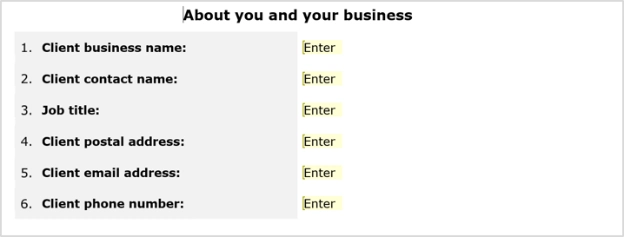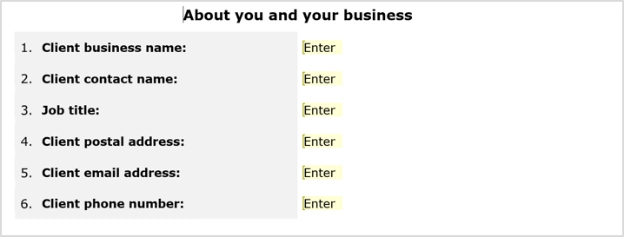Why Virtual Assistant Contracts Matter for Your Business

-
Why Virtual Assistant Contracts Matter for Your Business
- My Experience With KoffeeKlatch Virtual Assistant Contracts
- The Training and Support You Get
- The Booking Form
- About Us
- About the Work
- About Payments
- Virtual Assistant Insurance
- Data Protection
- Summary – What Virtual Assistant Contracts Cover
- Final Thoughts
- FAQs About Virtual Assistant Contracts
Why Virtual Assistant Contracts Matter for Your Business
When you launch your Virtual Assistant business, contracts might not be the first thing you think about. A well-written virtual assistant agreement helps you ask the right questions, set clear boundaries and start every client relationship on the right foot.
Back in 2011, I worked without contracts and it showed. Onboarding new clients was messy. I had no clear payment terms, no proper invoicing details and no way to track when a client started. Even worse, I had no structure to explain how I worked.
Everything changed when I discovered KoffeeKlatch. Their virtual assistant contracts transformed the way I ran my business. They made onboarding simple, gave me a clear process and reassured clients that their business was in safe hands.
Good contracts don’t just protect you, they give clients confidence too. When everything is written down, they know exactly what to expect and can trust they’re working with a professional who takes their business seriously.
My Experience With KoffeeKlatch Virtual Assistant Contracts
I first bought my VA contracts in 2018. By 2025, it was clear I needed an update. The world had changed, Covid reshaped how we work and AI transformed how businesses run. I wanted my virtual assistant contracts to reflect those changes and protect my business properly.
As an existing KoffeeKlatch customer, I received a 20% discount and chose the Standard Level virtual assistant agreement (usually £140 + VAT). They also offer global virtual assistant contracts, which are ideal if you support clients overseas.
I decided on the brandable version, which costs a little more but allows you to add your own logo. That small touch makes your documents look professional and helps establish you as a serious business from the start.
The Training and Support You Get
When you buy KoffeeKlatch virtual assistant contracts, you don’t just download a template and hope for the best. You also receive training and ongoing support to help you use each section correctly. I recommend setting aside a full day to work through everything.
Here’s what stood out for me:
Training materials: Step-by-step guidance shows you how to complete each section so you feel confident before sending contracts to clients.
Data Protection Policy: This section made me think carefully about how long I keep client data and who has access to it. For me, it’s only myself and my accountant (UK-based). I now set a yearly reminder to review all data.
Facebook support group: Ideal for new VAs who want reassurance or need advice on setting things up.
Email updates: KoffeeKlatch send regular legal and business updates direct to your inbox, so you stay informed about changes that could affect your business.
The only drawback is that the KoffeeKlatch website can feel overwhelming at first, there’s a lot of information and it isn’t always clear which contract you need. The good news is their team respond quickly to emails, so if you’re unsure, you can ask and get clear direction.
Support levels vary depending on which contract package you choose:
Pre Startup: 6 months of support
Business with regular revenue: 12 months of support
Established business models: 18 months of support
I purchased the “Business with regular revenue” option, which included 12 months of support. After that period ends, you can’t download updated versions, so it’s worth saving everything during your support window.
The Booking Form
One of the most valuable parts of the KoffeeKlatch virtual assistant contracts is the booking form. Think of it as your built-in VA contract template for gathering client details. This section records everything you need, business name, contact name, postal address, email and phone number.
Having all this information in one place saves time later. For example:
You legally need a postal address on your invoices.
You can add their details straight into your accounting software or invoice template.
You can store their email in Outlook (or whichever system you use) and save their phone number in your mobile.
Image description: Image showing the client details section of the KoffeeKlatch virtual assistant booking form.
About Us
This part of the booking form sets out your details as the Virtual Assistant. In a virtual assistant agreement, it might seem obvious, but for clients it gives real peace of mind.
It confirms you are who you say you are.
It reassures them that you’re a genuine business, not a scam.
It allows them to look you up online for extra reassurance.
That’s why it’s so important to keep your business name, job title and contact details up to date and to make sure your online presence matches. I always recommend setting up professional social profiles and my favourite place for building credibility is LinkedIn. You can read my blog: LinkedIn Content Creation for Virtual Assistants here.
Image description: Image from the KoffeeKlatch Booking Form showing the About You and Your Business section with fields for client information.
About the Work
This section of your virtual assistant contracts is where you set out your usual working hours. Maybe you only work mornings, or perhaps you take Wednesdays off, it’s completely your choice. By adding this detail to the contract, clients know exactly when you’re available and when you’re not.
It also covers your preferred communication channels. You might prefer email, phone calls, or WhatsApp. Or perhaps you use tools such as Slack or Teams. Whatever works best for you, this section ensures your preferences are clear from the start.
Most importantly, contracts stop scope creep. Instead of clients expecting late-night messages or weekend work, your boundaries are written into the agreement. That makes it easier to say no, while still maintaining professionalism.
Image description: Image from the KoffeeKlatch Booking Form showing the section where Virtual Assistants record their working hours and preferred communication channels.
About Payments
Money conversations can feel awkward, but a contract removes that pressure. I have always verbally agreed my rate with a client before I send my contracts. Your rates and payment terms are written clearly into the booking form and your client signs to agree. That way, there’s no confusion later.
For example, you might:
Charge by the hour, package, or project.
Raise invoices at the end of each month.
Set a payment deadline (e.g. 14 days).
Accept payment by BACS, PayPal, or another method.
Once your payment terms are written down, there’s no need for back-and-forth about money, everything is agreed from the start and if any issues arise, you can refer back to your contracts with confidence.
Image description: Image from the KoffeeKlatch Booking Form showing the section where Virtual Assistants set their fees and payment terms.
If you’d like contracts that help you ask the right questions from the start, covering things like payment terms, working hours and data protection, you can find KoffeeKlatch contracts below.
Virtual Assistant Insurance
Contracts protect you, but so does insurance. Some clients will ask for it and others won’t, but having cover in place is essential if you want to run your VA business with confidence.
I use virtual assistant insurance from Markel. It includes:
Professional indemnity insurance: protects you if there are mistakes in your work.
Public liability insurance: covers accidents involving other people or their property.
For most Virtual Assistants, this level of VA business insurance is more than enough. I also include it in my booking form so clients know from the start that I’m fully covered.
Image description: Image from the KoffeeKlatch Booking Form showing the section where Virtual Assistants record their insurance cover and provider details.
I use Markel to keep my VA business protected. Explore their insurance below.
Data Protection
The KoffeeKlatch virtual assistant contracts include a dedicated Data Protection Form that makes you stop and think about how you handle client data. Without it, many Virtual Assistants wouldn’t consider what happens to client files or how long they should be kept.
This section forces you to create a clear plan from how you store information to what happens when a client stops working with you. It’s similar to having a virtual assistant terms and conditions template, but focused on data security, giving both you and your clients peace of mind.
Image description: Image from the KoffeeKlatch Booking Form showing the section where Virtual Assistants record how long client data is kept and how it is managed.
You’ll sometimes see Virtual Assistants promoting the “laptop on the beach” lifestyle, but before you take your work abroad, you need to think carefully about data security. The KoffeeKlatch virtual assistant contracts make you stop and consider what happens to client data if you’re working outside the UK or EU.
Even if you’re not a digital nomad, this section is still valuable. It highlights the legal side of running a VA business.
Image description: Image from the KoffeeKlatch Booking Form showing the section where Virtual Assistants record whether client data is transferred outside the UK or EU.
Summary – What Virtual Assistant Contracts Cover
A good contract brings everything together in one place. With a clear virtual assistant agreement, you and your clients know exactly what to expect. Here’s what’s included:
Client details
Your business details
Working hours and communication channels
Fees and payment terms
Data protection
Insurance
Having these essentials written down protects your business, sets boundaries and builds trust with every new client.
Final Thoughts
If you’re starting out as a Virtual Assistant, don’t skip contracts. They protect you, your clients and your business. More than that, they help you ask the right questions, set clear boundaries and treat your work like a real business from day one.
I’ve used KoffeeKlatch virtual assistant contracts since 2018 and updating them in 2025 gave me real peace of mind that my business is protected for the future.
Take the time to read, understand and set up your contracts properly. It’s one of the best investments you can make as a VA and it will serve you and your clients for years to come.
Explore KoffeeKlatch contracts below and get started with your own.
FAQs About Virtual Assistant Contracts
Do Virtual Assistants use contracts?
Most successful VAs use virtual assistant contracts. They’re not just paperwork, they protect both sides, set boundaries and make sure payment terms are clear. Using contracts shows you’re running a real business.
What should a Virtual Assistant contract include?
A solid virtual assistant agreement should include client details, your business details, working hours, communication preferences, payment terms, data protection and insurance. I use KoffeeKlatch because their contracts already include all of this. They’ve done the legal work for you, so you don’t have to figure it out yourself.
Do Virtual Assistants need insurance?
Insurance isn’t always required, but it’s highly recommended. Virtual assistant insurance protects you against mistakes in your work (professional indemnity) and accidents involving clients or their property (public liability).
Where can I buy contracts and insurance for my Virtual Assistant business?
I use KoffeeKlatch for my virtual assistant contracts. They make onboarding simple and cover everything from payment terms to data protection. For insurance, I use Markel. Their virtual assistant insurance gives me peace of mind with professional indemnity and public liability cover, exactly what I need to run my business with confidence.
Now read: Top 10 Virtual Assistant Tools (Free + Paid)
And read: Password Security for Virtual Assistants: Keep Your Business Safe
-
Why Virtual Assistant Contracts Matter for Your Business
- My Experience With KoffeeKlatch Virtual Assistant Contracts
- The Training and Support You Get
- The Booking Form
- About Us
- About the Work
- About Payments
- Virtual Assistant Insurance
- Data Protection
- Summary – What Virtual Assistant Contracts Cover
- Final Thoughts
- FAQs About Virtual Assistant Contracts







